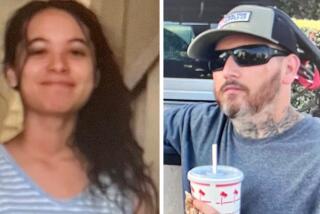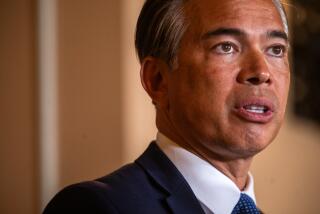Orange County Blacks Show New Political Clout : Activism: Local African American leaders, long quiet in the region, have mobilized and are wielding influence in the wake of a sheriff deputy’s fatal shooting.
- Share via
When a La Habra mother was beaten to death in a mall parking lot last September after a shouting match that was reportedly laced with racial slurs, police said initially that her attackers may have killed her because she was black, and prosecutors even added charges--subsequently dropped--that her death was racially motivated.
Yet there was no outcry then from Orange County’s black community--no meetings with top county officials, no impassioned press conferences, no demands for a federal investigation.
“There was no response, and there should have been,” said Randall Jordan, a minister who publishes a black monthly newspaper in Orange County. “I guess everybody thought it may have been a futile effort. At that time, I just don’t think there was the organization between the various black groups.”
Now jump ahead four months to January, 1994: A sheriff’s deputy--a black deputy--has been shot and killed by a fellow officer in what authorities describe as a tragic Christmas Day training mishap. Black leaders--often virtually invisible in local politics--are angry.
They hold press conferences. They meet with county politicians. They criticize the slow and incomplete release of information. And, in a move stunning even some longtime county-watchers, they persuade Sheriff Brad Gates to request a state investigation into the shooting. All this in a case in which no evidence has surfaced to suggest that race played any part.
The difference this time, some black leaders say, can be traced to a meeting in Irvine three months ago at which black groups from the business, religious and civic communities came together to mobilize their sparse resources in a renewed push for empowerment.
Some remain skeptical that a group comprising less than 2% of the county population can ever achieve much of a political voice. But the events of the three weeks following the death of Deputy Darryn Leroy Robins have caused others to take notice.
“I’ve been surprised that the black community has gotten as deeply involved in this issue as they have,” said Dan Wooldridge, a political consultant who worked with the Sheriff’s Department for years and as an aide to then-Supervisor Don R. Roth. “There’s a heightened perception now that the black community will continue to play a higher-profile role in decisions that affect not only their community, but the whole community.”
But if black leaders have staked out a higher ground on the Robins issue, their role has also attracted derision from people who accuse them of inflaming an already volatile issue.
“All they want to do is pursue their own agenda. They don’t give a damn about Darryn Robins,” said Robert MacLeod, general manager of the Orange County Deputy Sheriff’s Assn.
“Everything I have heard about this case from the beginning indicates (the shooting) was an accident, and there was absolutely nothing racial about it,” MacLeod said in an interview.
Black leaders “infuriated the vast majority of Orange County sheriff’s deputies with their quotes in (the newspaper), and that’s black deputies, white deputies, men and women, young and old,” he said. “They say, ‘He’s one of our own,’ but they’re out there disrupting the grieving of the family. . . . All they’re doing is rubbing salt in the wounds.”
Robins, 30, is survived by a wife and a daughter, now 18 months old. Family members in the Los Angeles area have declined to discuss the Orange County black community’s role in the case, saying they want to await the results of the district attorney’s investigation.
The Orange County district attorney’s office is investigating the Dec. 25 incident behind a Lake Forest movie theater to determine whether the shooter, Deputy Brian Scanlan, 32, of Anaheim should face criminal charges. Officials are looking at the possibility that Robins, playing the part of a suspect in a car stop during an informal training session, startled Scanlan by reaching for a gun hidden behind his car visor, and that Scanlan then shot him.
Unanswered in the case is the critical question of why deputies were training in a public area with a loaded weapon--in apparent violation of Sheriff’s Department policies.
Local officials challenged Gates from the outset over that issue, and black leaders joined in soon after the shooting to question whether the district attorney’s office faced a conflict of interest in investigating the case.
A 1985 county policy sets out procedures for the district attorney to investigate all officer-involved shootings, and no one has suggested that prosecutors have misstepped in their investigation. Some black leaders insist nonetheless that the office may be too close to the Sheriff’s Department to offer an unbiased assessment.
Within a week of the shooting, about 40 members of a loosely formed coalition, representing some 15 groups from various facets of Orange County’s black community, met to discuss how to respond to the shooting, said Jordan, publisher of the Black Orange, a monthly newspaper with a circulation of 2,500 in the local black community. Their ranks included members of the Black Chamber of Commerce, the Baptist Ministers Fellowship Conference, the National Council of Negro Women, the Prince Hall Masons and other groups, officials said.
Two days later, the group met again. Some two dozen people showed up, Jordan said. It was not a dramatic turnout, but it was a start.
After all, the black community has usually held little political voice in a county that spent years trying to shake its image as a home to the John Birch Society: There are no blacks elected to any of the city councils, the county Board of Supervisors, or state or federal offices. More often than not, Latinos and Asians, rather than blacks, have been the ones to press issues of minority-wide interest, such as electoral redistricting.
And even when cases affecting blacks have proven controversial--such as the September death of the woman in La Habra, where some witnesses said she may have instigated and prolonged the fight with two white women that caused her death--local black leaders have been criticized as too slow to take up the cause.
The Robins case may change that, some black community members suggest.
“I think everybody that reads the paper and watches the television knows that there’s a new black voice in Orange County . . . since the shooting,” said Eugene Wheeler, a health care administrator who heads a business and civic group called 100 Black Men of Orange County.
*
Wheeler said black leaders knew when they began speaking out on the Robins case that there would be opposition. But he said dialogue between blacks and other county groups--both pro and con--is essential to political growth.
“At least we’re talking now,” Wheeler said. “It wasn’t happening before because there wasn’t any major effort. But at some point, when we feel something is unjustly done that affects the African community, we need to speak out and be heard.”
One pivotal development in the black community’s response to the Robins case came two weeks after the shooting, when Wheeler and Jordan met with Undersheriff Raul Ramos for some two hours to press their case about the need for an independent investigation.
Three days later, Gates pointed to community concerns in asking state Atty. Gen. Dan Lungren to intervene in the case and open an investigation. The attorney general turned him down, but even so the request itself marked a newfound credibility for a black community struggling to gain recognition.
*
Yet even within the black community, there have been differences of opinion over how aggressively to push the Robins case.
George Williams, executive director of the Orange County Urban League, says it is premature to talk about civil rights violations in the deputy shooting when the basic facts have yet to come out.
“We don’t know” what happened, Williams said. “That’s the pain that surrounds this whole issue. Nobody is coming forward with any information that satisfies our need to know.”
Williams said he has discussed the shooting with black community leaders in an attempt to devise an appropriate response. However, Williams said he doubts there is much black leaders can do until the district attorney’s office completes its investigation.
Even as some urge patience, others suggest that the official silence surrounding the Robins case has only fueled wild and sometimes sinister speculation in the black community.
*
Times staff writer Tammerlin Drummond contributed to this story.
More to Read
Sign up for Essential California
The most important California stories and recommendations in your inbox every morning.
You may occasionally receive promotional content from the Los Angeles Times.













